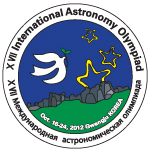International Olympiads
International Olympiads
International Astronomy Olympiad (IAO)
About IAO
The Olympiad is sponsored by the Olympic Coordinating Council (OCC) under the aegis of the Euro-Asian Astronomical Society (EAAS).
The OCC is composed of 9-17 members, including the chairman Dr. Michael G.
Gavrilov, representatives of the founding organization, representatives of major international astronomical organizations, and representatives of some of the participating countries.

The Official Logo of the 17th IAO
Objectives
The objectives of the Olympiad are to support the continuing development of astronomy, to disseminate astronomical knowledge, and to encourage international exchanges of school education in the field of astronomy and physics to reflect the needs arising from the increasing importance of astronomy within scientific fields and across society in general.
- To disseminate scientific knowledge and to encourage scientific research in astronomy and related scientific fields.
- To enhance the interest of teenage children regarding astronomy, physics and space travel.
- To identify and support talented young students.
- To encourage the activities of science organizations (associations, clubs, etc.)
- To improve the educational level in the fields of astronomy and astrophysics in middle and high school curricula.
- To stimulate and encourage learning in astronomical classes at the middle and high school level.
- To provide career guidance to participating students.
History
The IAO was first established as an annual competition in astronomy for middle and high school students on June 7, 1996. The first Olympiad took place from November 1st - 8th, 1996 in the Special Astrophysical Observatory (SAO) affiliated with the Russia Academy of Science (RAS) located in Niznij Arkhyz of Russia's northern Caucasus region. Korea attended the event for the first time with the participation of three high school student observers at the 7th annual Olympiad, which took place in 2002 at the same location with the participation of 12 contending teams from 10 countries. Korea was proud to host the 17th IAO in Gwangju from October 16-24 2012, with total 129 participants from 22 countries.
Eligibility for Participation
■ 3 juniors and 2 seniors are allowed to participate from each participating country
* Students who have won gold or silver medals in previous IAO contests are eligible to participate in the IAO of following years as supernumerary members. However, these students must not be in infringement of the age restrictions.
■ All participants (juniors/seniors) must be age 14 or over as of December 31st of the year of the Olympiad
i.e., born before December 31st of YYYY-14 for the Olympiad of the year YYYY
Juniors
- Must not have participated in any previous Olympiad
- Students in the graduating year of high school cannot participate as junior status
- Must be age 15 or less as of January 1st of the year of the Olympiad
i.e., born after January 1st of YYYY-15 for the Olympiad of the year YYYY
Seniors
- Students in their graduating year of high school can only participate as senior status
- If participating in the IAO for the first time: cannot be older than 18 as of January 1st of the year of the Olympiad
I.e. born after January 1st of YYYY-18 for the Olympiad of the year YYYY - If participating in the IAO for the second time: cannot be older than 17 as of January 1st of the year of the Olympiad
I.e. born after January 1st of YYYY-17 for the Olympiad of the year YYYY - If participating in the IAO for the third time or more: cannot be older than 16 as of January 1st of the year of the Olympiad
I.e. born after January 1st of YYYY-16 for the Olympiad of the year YYYY
Dates and Location
Each autumn (September 22~November 22), for a period of 8 to 10 days, the Olympiad is hosted at the site of each participating country by turns. However, it is stipulated that the IAO must be held at least once every 3 years in Russia, the Crimea or Moscow land in honor of their status as founding members.
Format of Competition
■ Theoretical Round : 4 hours in duration, consisting of a total of 5-6 questions for a perfect score of 40-48 points
■ Practical Round : 3-4 hours in duration, consisting of a total of 1-2 questions for a perfect score of 20 points.
The questions are based on actual research data provided by the host institution
■ Observational Round : An outdoor, nighttime competition using the naked eye or small telescopes. The location may be changed to indoors in the event of or cloudy sky or rain. Composed of a total of 1-3 questions (excluding sub-question sets), for a perfect score of 20 points.